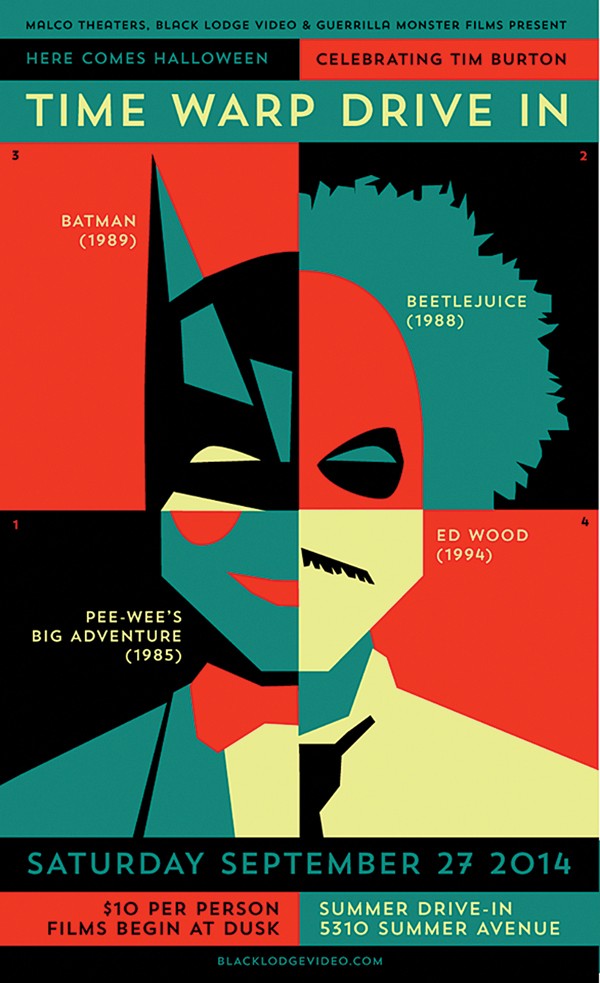 Lauren Rae Holtermann
Lauren Rae Holtermann
The September installment of the popular Time Warp Drive-In series celebrates American auteur Tim Burton. Like Stanley Kubrick, the subject of a past drive-in tribute, he is a director whose name has become an adjective. “Burton-esque” means a film with a Gothic outlook, elaborate set design, and a misunderstood outsider for a hero.
The program begins at dusk with Burton’s first feature film, Pee-wee’s Big Adventure. Even though it was made in 1985, many consider it to still be Burton’s best work, and it contains most of the elements that would eventually become Burton trademarks. Pee-wee Herman was the creation of Paul Reubens, a Los Angeles comic actor and Groundlings cast member. His somewhat creepy children’s show for grown-ups originated as an experimental theater show that got noticed by HBO and turned into a late-night special. By 1984, it was selling out Madison Square Garden. Reubens and his co-writer Phil Hartman tapped Burton to direct the movie after seeing his legendary short Frankenweenie. Pee-wee’s Big Adventure showcases Burton’s visual inventiveness with the long introductory sequence that takes the audience inside the world that Pee-wee has built for himself. As it always happens with Burton’s characters, the trouble begins when the outsider is forced to deal with the mundane world: In this case, Pee-wee’s prized bike is stolen, and he must embark on a scary trip to grown-up land to retrieve it. There are also hints of Burton’s gothic side, as with the unforgettable Large Marge scene, which is as scary in its own way as any given scene in the slasher films that dominated the horror box office of the mid-1980s.

Michael Keaton as Burton’s Batman
The evening’s second feature is Batman. Looking back from the 21st century, it seems that Burton’s biggest single contribution to popular culture is the superhero comic book movie. When it was released in 1989, more than a decade had passed since Richard Donner’s Superman had dominated the box office without a repeat performance by a cinematic superhero. Befitting the character, Batman is much darker than Donner’s Superman, both visually and thematically. The switch from the campy 1960s take on the Caped Crusader to the attempt at psychologically grounding the character mirrored the cynical turn comics had taken in the 1980s in the wake of Alan Moore’s The Watchmen and Batman: The Killing Joke, and Frank Miller’s The Dark Knight Returns. But Burton’s Batman is a long way from the glowering Christian Bale of Christopher Nolan’s trilogy. Michael Keaton plays Bruce Wayne as a guy who has enough self-awareness to understand that this whole setup is ridiculous, and yet he can’t help himself: He has to dress up like a bat and fight crime. Jack Nicholson is terrific as the Joker, and his clown-themed accouterments give Burton a chance to let his cartoonish visual imagination run wild on the screen. Mix in a soundtrack by Prince, and you’ve got a stone-cold Hollywood classic whose influence is still being felt today.
1988’s Beetlejuice is a critical part of Burton’s filmography. The Ghostbusters-influenced supernatural comedy was the first time the director’s Gothic aesthetic was fully unleashed. It was the first time he had worked with Keaton, and it launched the film careers of Winona Ryder and Alec Baldwin. This pre-CGI special-effects fest mixes live action practical effect, stop motion, and every other visual trick Burton had learned from studying classic horror and monster movies. The jokes in Beetlejuice hold up surprisingly well, mostly due to the deadpan commitment on the part of the actors.
The final film of the evening is my personal favorite of all of Burton’s work, Ed Wood. The stylized biopic of the man known as the worst director in the world benefits from a terrific script by screenwriters Scott Alexander and Larry Karaszewski, who would later team up on the Memphis-filmed The People vs. Larry Flynt. It was the second time Burton would team up with Johnny Depp after 1990’s Edward Scissorhands. Depp is terrific as the unflappable, cross-dressing title character, as is the entire cast, which includes Martin Landau (who won a Best Supporting Actor Academy Award for his portrayal of Bela Lugosi), Bill Murray, Sarah Jessica Parker, and Patricia Arquette. Those staying late for the final movie will find that the Time Warp has saved the best for last.